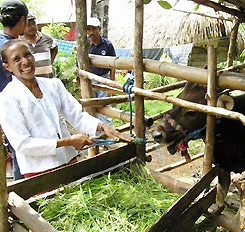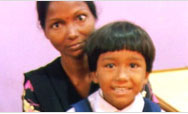You are here » Home » Telling Our Story
Success Story
High-value crops boost farmers’ incomes and economic security
Farmers Profit from Crop Diversity

| |
Photo: NCBA/Shane McCarthy
|
|
An East Timorese farmer fattens cattle for export to Indonesian West Timor.
More than 90 percent of East Timor’s vanilla is classified “grade one,” attracting some of the world’s largest buyers.
|
In an effort to boost East Timor’s economic growth and raise incomes for farming families, USAID has supported the work of the Cooperative Café Timor, a federation of Timorese-owned cooperatives that produce and export premium organic coffee. The Cooperative Café Timor and its sister cooperatives count more than 20,000 member families who grow coffee, the country’s most valuable export. Since first starting to work with USAID in 2000, the cooperative has opened a training academy for crop diversification, provided business training to entrepreneurs, developed export markets, and opened trade links with neighboring Indonesia.
With technical assistance and training from USAID, the cooperative has helped its members diversify crops and activities to include high-value alternatives to coffee, such as vanilla bean production and cattle fattening. Now almost 3,000 farms produce vanilla beans for international markets. More than 90 percent of their crop has achieved “grade one” classification, attracting some of the world’s largest buyers for use in premium extracts and ice creams. Lucrative cattle fattening activities have also expanded, enabling farmers to export cattle to West Timor in neighboring Indonesia. The 500 participating farms build special enclosures for the cattle and bring fodder to them. By confining the cattle, the farmers gain time and resources otherwise spent building and maintaining fences. High demand for the fattened cattle in Indonesian West Timor has prompted the two countries to open a second official border crossing for cattle exports.
Coffee remains a major crop in East Timor, with exports totaling $7 million in 2004. The cooperative has significantly improved global market opportunities for coffee crops. For instance, it has earned organic and Fair Trade certifications, enabling members to demand higher prices for their coffee. One of the cooperative’s largest coffee buyers is Starbucks, which sells the Arabian Mocha Timor blend around the world. The Cooperative Café Timor has now become a self-sustaining business model for coffee production and export activities. USAID’s assistance is part of an effort to help East Timor diversify and increase agricultural production and expand both domestic and international markets for its products.
Print-friendly version of this page (353kb - PDF)
Click here for high-res photo
Back to Top ^ | 

